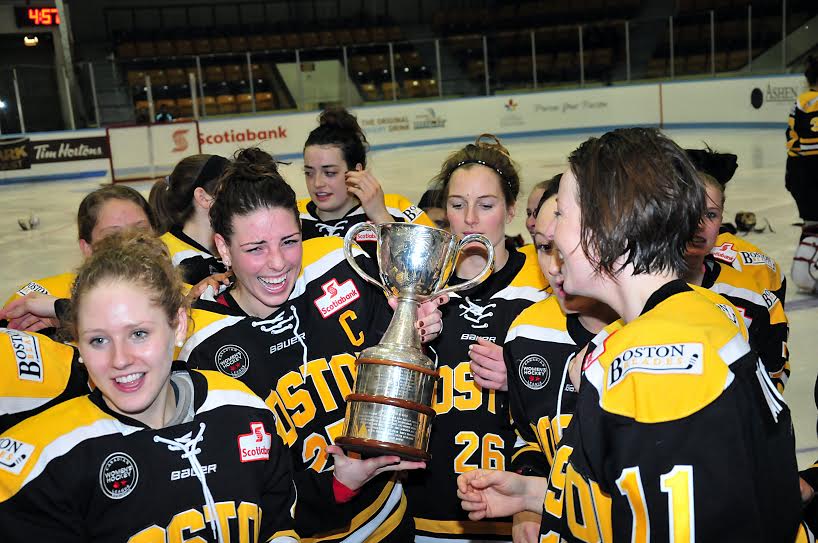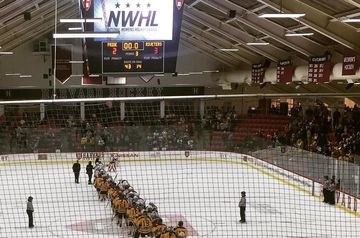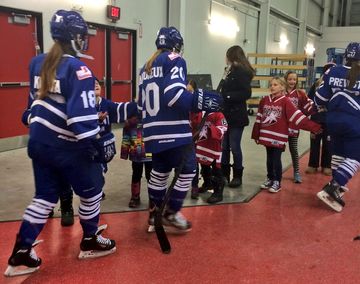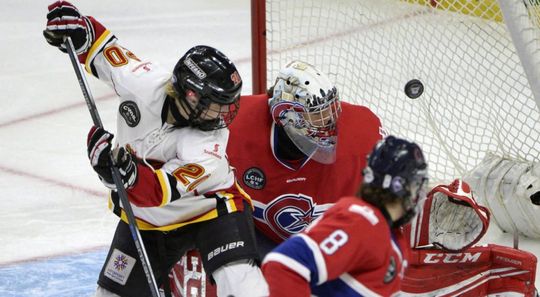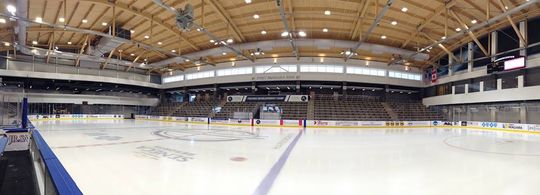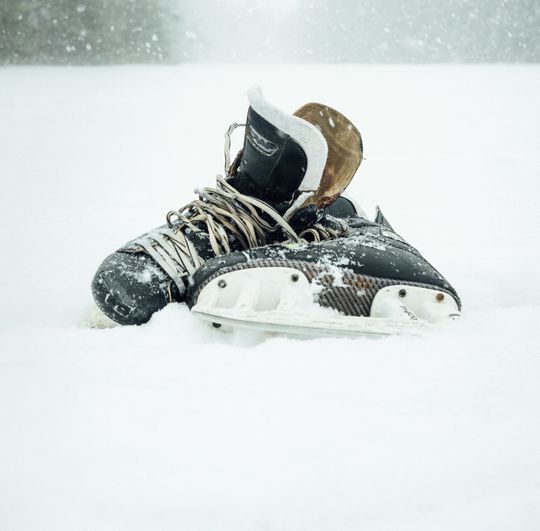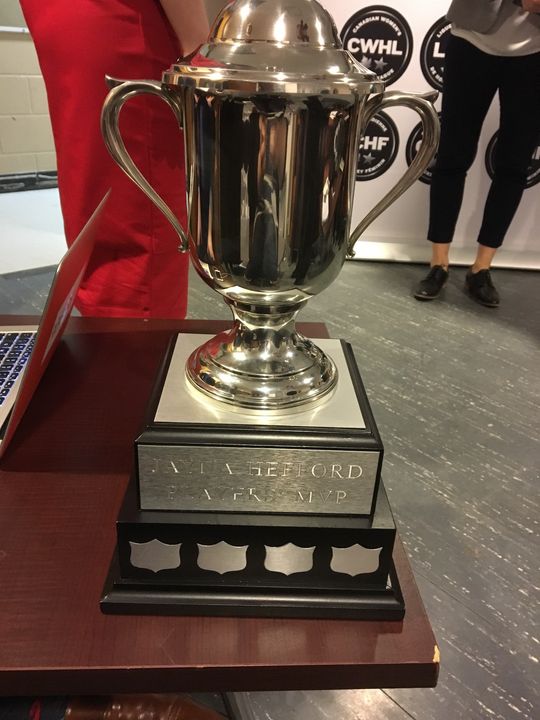Last year, when I was exclusively reporting on the CWHL's Boston Blades, they were a team doing magical things at a special time.
At the time, the Canadian Women's Hockey League was the only place where women in the United States and Canada could play professionally, and the Blades had a dominant season, losing only five games all year as the CWHL's only American franchise.
Their record will show seven losses, though, and that's because of the two games they forfeited to the Montreal Stars as they went on strike one weekend in November. Blades players refused to sign multi-year deals with the CWHL without any promise of pay. At the time, players disclosed to me that they knew of a league in the works -- an American league -- that might pay its players. As a result, they didn't want to commit to a long-term future with the CWHL, as they knew that the landscape of the sport might be in flux.
The league they were talking about came to pass in the form of the National Women's Hockey League, which created four new teams in the United States and promised a minimum salary of $10,000 a year for roster players. The majority of Boston Blades players applied for releases and signed with an NWHL team, all of which are located in the Northeast.
Tara Watchorn and Genevieve Lacasse remained, as the team's two Canadian players. Watchorn is a proven defender at the international level for Team Canada whose size, physical style, and bomb of a shot make her an all-star. She earned the captain's C on her jersey, after previous captains Hilary Knight and Jessica Koizumi both departed the team for the Boston Pride and Connecticut Whale, respectively. Lacasse is a great goaltender -- she's naturally talented and when she is on her game, every save looks completely effortless.
Also remaining were two Americans, Megan Myers and Dru Burns. Burns plays defense, though the 2013 Boston College graduate from Plano, Texas, only played one game last season. Myers, a forward, only played 12 games, but had been a standout for Utica College in NCAA Division III.
All stayed on the team knowing they would have increased responsibility on a team with little professional experience to go around.
"Since last year, my role has changed drastically. Last year I was in a more defense and assistant coaching role. I definitely see teammates looking to me and Megan Myers and [Tara] Watchorn about how to act while traveling, how to dress, how to present ourselves," Burns said about her new position on the team.
The Blades also had some much-discussed front-office changes, as Coach Digit Murphy and GM Aronda Kirby were fired by the CWHL in the offseason over a trademark dispute. They brought in Krista Patronick as the GM, whose positive attitude and practice of outreach to fans and the media alike made the franchise immediately feel more approachable.
Coach Brian McCloskey was fired from the University of New Hampshire after a physical altercation with a player on the bench a couple of years ago. Charges were brought against him by Strafford County in New Hampshire, and he's currently completing a diversion program in order to have the charges dropped.
The case file from the incident reads like a study from a mock trial. There are so many different perspectives, and each one feels true as you read it. The physical and emotional violation was at least mildly criminal, as determined by the state of New Hampshire; but that aside, it brought to light some disturbing possible consequences of power structures left unchecked.
With the Blades, everyone brought into the organization has a rare opportunity, in the form of an almost completely clean slate and a chance to recreate a team and a community from the ground up. It's no easy task.
For Megan Myers, remaining with the team has been a big promotion. Last season after winning the Clarkson Cup, Blades' coach Digit Murphy praised the work ethic of players like Myers, but was clear in her comments to the press that players so low on the depth chart weren't given ice time in the deciding game.
Myers said that joining the Blades for the 2014-15 season was a huge adjustment. The former Utica Pioneer will now see a better quality of competition as one of the more experienced players on the team. "It was a lot different, coming to the Blades after college," she said. "I was the leading scorer, a starter, and suddenly I was playing a lot less."
Now, Myers will be expected to carry a heavier load. "This year, so far, I'm just trying to get my wind back."
Both Myers and Burns mentioned the important addition of Kristina Brown, who was drafted by the Blades this season after she had spent two seasons playing in Europe. Burns called her a "liaison between the veterans and the rookies on [the] team," and Myers said she has been a leader who has brought the team together.
Brown told the Victory Press that she made her decision to join the CWHL in just one day, after being contacted directly by Coach McCloskey about joining the team. She was just settling into a new job in the Boston area and hadn't yet thought of a return to professional hockey, but McCloskey and Patronick sought her out.
"I've been satisfied and excited," Brown said. She's happy about how the team is coming together. "One of the most potent characteristics you can have as a team is chemistry on the ice and off the ice," she said. "The best built teams aren't always the best teams because they don't have that. We've gotten to know each other and it's paying off."
The team has rallied under captain Tara Watchorn. "She's been awesome. I knew we were going to need her," Myers said. "Krista [Patronick] wasn't on our last road trip, so Tara really took on that role of team manager, team mom, and team captain. I hope she's having as much fun as the rest of us are."
"We're the underdogs," Myers said. But she's definitely enjoying the new responsibility that comes along with that.
There is a certain awkwardness that comes from having your franchise be on top of the world one day and gutted the next; for example, very few players who toured with the Clarkson Cup this autumn had actually won it the previous season. But there's something to be said for two professional hockey teams co-existing in Boston. The first year, with the abrupt departures, was bound to be rough, and there are still questions about how the CWHL and NWHL can coexist, especially in New England, with so many elite players graduating from the region's colleges all the time, who are equipped with NCAA experience against some of the best players in the world and ties to the region that could keep them playing hockey there for years to come. Now they have choices, and how those choices play out will guide each league going forward.
Both leagues may also have to confront these questions down the line in the Midwest, in places like Wisconsin and Minnesota and North Dakota, which have long been known as hotbeds of college hockey. Minnesota has been cited by both leagues as a potential area for expansion, in the vaguest possible terms. The Minnesota Whitecaps, formerly of both the Western Women's Hockey League and the CWHL, are currently an entire team of free agents, many of whom are Olympians themselves. But right now, playing pro hockey generally means moving east, unless you want to live in Calgary. This may not be a bad choice, though, since Calgary is currently arguably the best team in the CWHL and an early pick for the championship.
Even if the Boston Blades are extremely unlikely to repeat as Clarkson Cup champs, and are even unlikely to win a huge amount of games this season, the clean slate could have some benefits. The Blades are kind of ground zero for non-traditional development routes in American women's hockey -- if a notable American player has ties to the Boston area and isn't in college, or the NWHL, there's a good chance she's either with the Blades or has been in the past.
GM Krista Patronick doesn't think the team's record is representative of the effort they are giving: "The goal of the team is to continue to improve and get better, defend the Clarkson Cup and achieve the winningest record possible. We have a six game stretch coming up where we will be highly competitive. This is a talented team despite the turnover; they work hard. They have a no-quit attitude and a lot of heart. These next six games are really important and I think will show people what we are made of." After Patronick spoke to the Victory Press, the Blades went on to lose their next four games to the Brampton Thunder, dropping to 1-9 on the season.
However, their attitude has continued to be positive. It's easy to malign teams for not winning, and there is a lot to be unpacked about what it means to play women's sports professionally without pay. But for a team like the Blades, the ability to compete has an indelible value. For every Olympic-caliber athlete in women's hockey, there are hundreds of others who may never make the Olympics, but still deserve to be playing at a high level.
At the same time, let's not pretend that the Blades' poor record is unprecedented. In 2012-13, the CWHL Alberta team (the Inferno's predecessor) won just 3 games total. The Brampton Thunder had 3 regulation wins all of last season. The CWHL has not, of late, been known for top-to-bottom parity.
This transition year for both leagues has had its bumps in the road. But the Blades are still here. The CWHL has issued a new promise to pay its players by the 2017-18 season. Both teams in Boston have the potential to be competitive and share the same market. But whether they actually will in the long view is still uncertain.
Right now, the Blades are still seeking their first regulation win of the season. If they string a couple of those together, it won't just be good for the team, but for the whole sport. Players like Megan Myers, for example, aren't going away, and if the interest among youth players in the CWHL and NWHL is any indication, we have less than a decade to go before both leagues' draft classes are burgeoning in both numbers and talent.
If you have a cynical attitude about the CWHL's Blades, or any criticism of the talent depth in the sport right now: just wait. The change is coming faster, probably, than any of us realize.
(Photo credit: courtesy of the Canadian Women's Hockey League)
